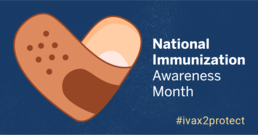National Immunization Awareness Month
 |
August is National Immunization Awareness Month. This month, the Centers for Disease Control and Prevention (CDC) is raising awareness about the importance of immunizations in preventing disease and saving lives.
Vaccines are often associated with children. However, CDC is encouraging communities across the nation to use this month to help raise awareness about the important role immunization plays in preventing serious, sometimes deadly, diseases across the lifespan. Vaccines can save the lives of seniors, mothers, adolescents, those who travel internationally and individuals who work as health care providers and are at a high-risk for contracting diseases.
It is important to make sure children are vaccinated before the back-to-school rush. Immunizations ensure your child’s long-term health while also protecting the health of classmates, friends, family and others in the community. You can start by following CDC’s recommended immunization schedule.
For more information on resources, programs and partnerships that aim to increase vaccination rates among minority populations, visit the CDC website or vaccines.gov.


